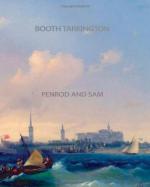For some reason, he put a considerable distance between himself and the taffy-stand, but before long halted in the presence of a red-faced man who flourished a long fork over a small cooking apparatus and shouted jovially: “Winnies! Here’s your hot winnies! Hot winny-wurst! Food for the over-worked brain, nourishing for the weak stummick, entertaining for the tired business man! Here’s your hot winnies, three for a nickel, a half-a-dime, the twentieth-pot-of-a-dollah!”
This, above all nectar and ambrosia, was the favourite dish of Penrod Schofield. Nothing inside him now craved it—on the contrary! But memory is the great hypnotist; his mind argued against his inwards that opportunity knocked at his door: “winny-wurst” was rigidly forbidden by the home authorities. Besides, there was a last nickel in his pocket; and nature protested against its survival. Also, the redfaced man had himself proclaimed his wares nourishing for the weak stummick.
Penrod placed the nickel in the red hand of the red-faced man.
He ate two of the three greasy, cigarlike shapes cordially pressed upon him in return. The first bite convinced him that he had made a mistake; these winnies seemed of a very inferior flavour, almost unpleasant, in fact. But he felt obliged to conceal his poor opinion of them, for fear of offending the red-faced man. He ate without haste or eagerness—so slowly, indeed, that he began to think the redfaced man might dislike him, as a deterrent of trade. Perhaps Penrod’s mind was not working well, for he failed to remember that no law compelled him to remain under the eye of the red-faced man, but the virulent repulsion excited by his attempt to take a bite of the third sausage inspired him with at least an excuse for postponement.
“Mighty good,” he murmured feebly, placing the sausage in the pocket of his jacket with a shaking hand. “Guess I’ll save this one to eat at home, after—after dinner.”
He moved sluggishly away, wishing he had not thought of dinner. A side-show, undiscovered until now, failed to arouse his interest, not even exciting a wish that he had known of its existence when he had money. For a time he stared without attraction; the weather-worn colours conveying no meaning to comprehension at a huge canvas poster depicting the chief his torpid eye. Then, little by little, the poster became more vivid to his consciousness. There was a greenish-tinted person in the tent, it seemed, who thrived upon a reptilian diet.
Suddenly, Penrod decided that it was time to go home.
CHAPTER XX BROTHERS OF ANGELS
“Indeed, doctor,” said Mrs. Schofield, with agitation and profound conviction, just after eight o’clock that evening, “I shall always believe in mustard plasters—mustard plasters and hot—water bags. If it hadn’t been for them I don’t believed he’d have lived till you got here—I do not!”




